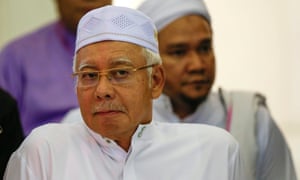
Prime minister Najib Razak has denied accusations that he stole money from state fund 1MDB. Photograph: Fazry Ismail/EPA
The former attorney-general in Malaysia was planning to reveal criminal charges of misappropriation against prime minister Najib Razak before being removed from his post last summer, an Australian television program has said.
The ABC’s Four Corners cited an unnamed “high-level source with direct knowledge of the affair” who said Abdul Gani Patail has informed several senior officials of his plan to confront the premier during a cabinet meeting scheduled for 29 July.
But the plan was leaked, ABC said, and the attorney-general stepped down before that date, officially for health reasons.
Deputy prime minister Muhyiddin Yassin — who would have replaced Najib — was sacked at the same time, after he made critical remarks over Najib’s handling of corruption allegations that are linked to the debt-laden state fund 1 MalaysiaDevelopment Bhd (1MDB).
Former attorney-general Patail has not commented since he left office and could not be immediately reached for a response. Last month, he refused to comment on a claim by Yassin that Patail had shown the former deputy prime minister evidence of a “criminal act” linked to Najib.
Days after Patail stepped down, independent news website Sarawak Report, published photos of what it said was a charge sheet for corruption against Najib, alleging he had received “a bribe in the sum of RM27 million”, close to £5 million.
Four Corners said it had independently corroborated the authenticity of that document and also established that in its final iteration the charge had been changed to criminal misappropriation.
The program spoke to Zaid Ibrahim, the former legal affairs minister and critic of Najib, who said the removal of the deputy prime minister and the attorney-general was a “massive dismantling of the institutions of government to cover up crime”.
“You sack your deputy prime minister who just wanted to know what happened. You sack the attorney general who I believe was putting a charge against you. Well this is unprecedented,” he said.
Najib has fought through accusations that he stole money from 1MDB, after it was revealed last July that $681m (£479m) had been paid into his personal bank account.
The prime minister has repeatedly denied that the money was from 1MDB and this year, the newly-installed attorney-general cleared him of any criminal offences, saying the millions transferred was a gift from the royal family in Saudi Arabia.
1MDB remains the subject of at least four investigations across the world, probing why billions have left the struggling state fund.
Four Corners cited a “high-level source” who had shown the program what it said were the prime minister’s bank accounts. It said these documents revealed a steady flow of money from 2011 to 2014, including $75m from a Saudi prince, $80m from the Saudi Ministry of Finance and $120m from a shell company in the British Virgin Islands.
Najib has denied any wrongdoing. When he was cleared by the new attorney-general in January he told the Guardian in a statement that it “confirmed what I have maintained all along: that no crime was committed.”
“This issue has been an unnecessary distraction for the country. Now that the matter has been comprehensively put to rest, it is time for us to unite and move on,” he added.
While working on the show in March, Four Corners reporter Linton Besser and camera operator Loue Eroglu were arrested and deported from Malaysia when they tried to question the premier as he walked into a mosque.
The police said the men were arrested for failing to comply with police instructions after they crossed a security line and “aggressively tried to approach the prime minister”.
Australian foreign minister Julie Bishop said at the time that that she was concerned “when there are instances of a crackdown on freedom of speech – in democracies particularly”. -theguardian.com
No comments:
Post a Comment
Note: Only a member of this blog may post a comment.